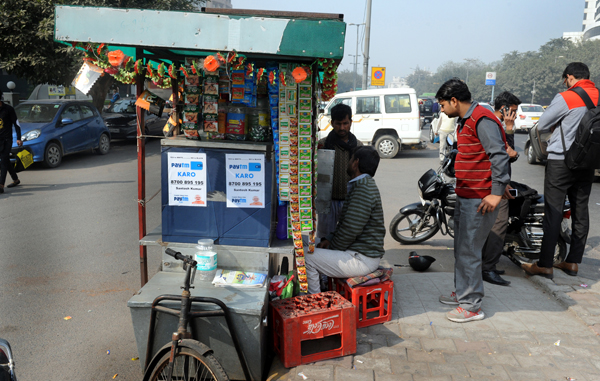There is no doubt that by going low on cash and promoting digital transaction, there will be benefits for all. But, at the moment, the long queues at banks and ATMs are the least encouraging of signs on the advantages of going digital. Let us understand what it will take for everyone to be part of the digital and less-cash environment to get a grip on where we are right now and the potential that exists. Everyone will need a bank account, which will be a must. Of course, there will be other ways to address some gaps by way of introducing pre-loaded cards in addition to the existing debit and credit cards.
The credit and debit cards are automatic fallout of bank accounts; the pre-loaded cards will address the need for those who are unbanked. This is a must for everyone wishing to transact digitally – consumers and providers of goods and services. There will be new forms of transactions by digital wallets, popularized by PayTm today.
Next, at the goods and service provider level, there will be a need to be part of an inter-banking connectivity. They will also need to have the provision for multiple digital currency acceptance mechanism. Point of sale terminal or POST, which is where the card swiping machine is used, is a case in point; registered mobile numbers with digital wallets will also become necessary to service customers who wish to pay by digital wallets. All these mechanisms ride on two fundamental essentials – electricity and internet. So, technology will be the backbone of digital payment being successful.

The fact that a little over 2 lakh ATM outlets exist in the country is a sign of how poor or limited our cash dispensing system currently is outside the conventional branch banking. The estimates on the current POSTs are no better and the claim by digital wallets being accepted at over 20 lakh outlets is a bit too much to believe. Now, if you see the urban to rural skew with the available ATMs and POSTs, chances are geographically 30 per cent of the country has access to 80-85 per cent of these current ATMs and POSTs. In no way do we seem to be ready with the infrastructure needed for the whole country to go digital or cashless immediately.
Considering 98 per cent of our monetary transaction is in cash, the mindset of cash usage is dominant and for it to change it will be much more than a mere 100-day task. It has to be a five-year plan with realistic targets and course correction as we go. For instance, we are a lot better today with digital wallets compared to dependency on cards and ATMs. Who knows what technology can do tomorrow to change this scenario further? Add to it, unless consumers are explained the benefits and advantages of going digital or cashless, they will never make a voluntary move. Such a communication has to be mass-scale and again driven with a 3-5 year timeframe. Countries like Sweden and Denmark, where the digital transactions are as high as 85-90 per cent, move happened over a span of time.
At the moment, there is no clarity on how long it will take for us to be low cash and high digital transaction economy. But, one thing that is sure is the fact that the move to digital money and cashless economy is a big challenge, which is already shaking the otherwise stable unorganised sector and the economy as a whole. This quarter, the growth has dipped and it is not clear as to when we will get to normalcy and what the new normalcy would mean. At the same time, the move may change the way we save, spend and deploy money. Whatever your role in this transition, watch out closely on developments lest you are taken in by frequent surprises.









